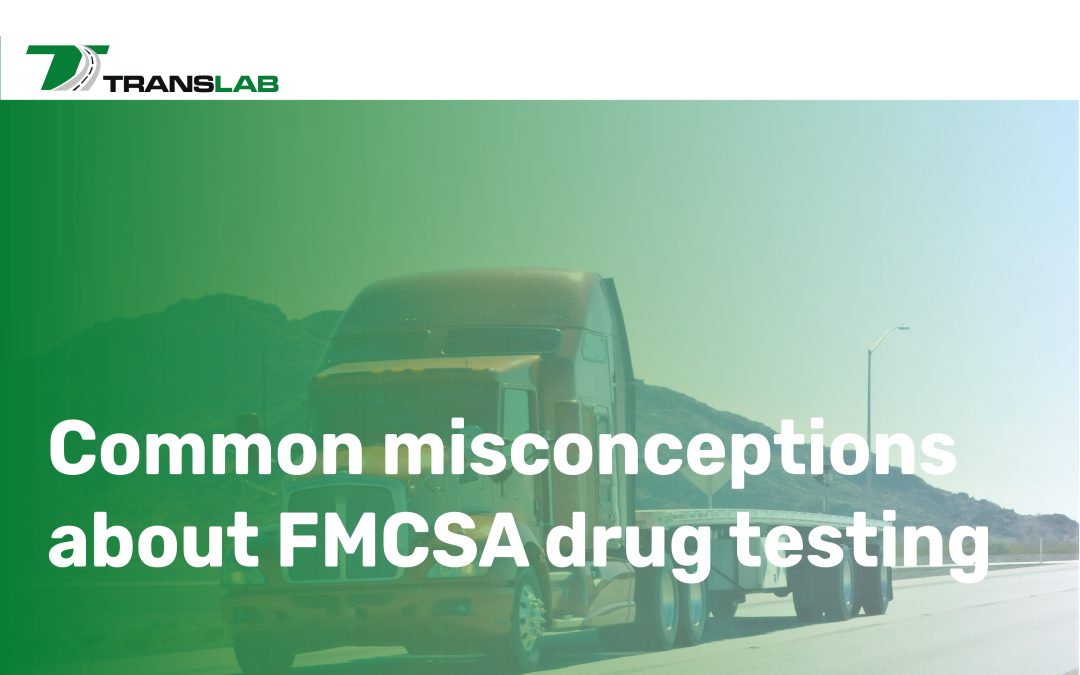Drug testing regulations can be daunting for CDL (Commercial Driver’s License) holders and motor carrier companies alike. Misinformation and misconceptions often cloud understanding, leading to confusion and compliance challenges. This blog aims to clear the air by addressing some of the most common misconceptions about FMCSA drug testing regulations.
Misconception 1: Only Drivers Involved in Accidents Need to be Tested
Reality: FMCSA regulations require various types of drug testing, not just post-accident testing. These include pre-employment, random, reasonable suspicion, return-to-duty, and follow-up testing. Each type serves a specific purpose in ensuring a drug-free transportation environment. For instance, random testing is a deterrent, while reasonable suspicion testing addresses immediate concerns based on observable behavior.
Misconception 2: Over-the-Counter Medications are Always Safe
Reality: While over-the-counter medications are legal, some can cause drowsiness or impair cognitive function, potentially affecting a driver’s ability to operate a vehicle safely. Drivers must understand how prescription or non-prescription medication may impact their performance. Always consult a healthcare professional and inform your employer if you take any medications that could affect your driving ability.
Misconception 3: CBD Products are Permissible Under FMCSA Regulations
Reality: Despite the growing popularity of CBD products, they can pose significant risks for CDL drivers. Many CBD products contain trace amounts of THC, the psychoactive compound in marijuana, which can result in a positive drug test. FMCSA maintains a zero-tolerance policy for THC, meaning that any detectable amount can lead to disqualification. Therefore, CDL drivers should avoid using CBD products to ensure compliance.
Misconception 4: Refusing a Drug Test is a Better Option Than Failing One
Reality: Under FMCSA regulations, refusing to take a mandated drug test is treated as a failed test. This refusal can lead to severe consequences, including immediate removal from safety-sensitive functions, mandatory referral to a Substance Abuse Professional (SAP), and completion of the return-to-duty process before resuming safety-sensitive duties. It is always better to comply with testing requirements than to refuse and face these repercussions.
Misconception 5: Once You Pass a Pre-Employment Test, You’re Clear
Reality: Passing a pre-employment drug test is just the beginning. FMCSA regulations require ongoing testing throughout a driver’s career. This includes random testing, which must be conducted annually at 50% of the average number of driver positions, and other tests based on specific circumstances. Continuous compliance is essential to maintain your CDL and stay in good standing with FMCSA.
Misconception 6: Only Urine Tests are Permitted
Reality: While urine tests are the most common method for drug testing under FMCSA regulations, other methods are increasingly being explored. The FMCSA has proposed rules to allow hair testing as an alternative, which can detect drug use over a more extended period. This move aims to enhance the testing program’s effectiveness and improve road safety. However, urine testing remains the standard.
Misconception 7: You Have No Rights During the Testing Process
Reality: Drivers have rights during the drug testing process. You can request to see the credentials of the person administering the test, ask for a split sample to be tested at a different laboratory if you test positive, and review the results. If you believe an error has occurred, you can challenge the results through the appropriate channels. Understanding your rights helps ensure that the process is fair and transparent.
Misconception 8: Positive Test Results Mean the End of Your Career
Reality: A positive drug test does not necessarily mean the end of your career. While it does result in immediate removal from safety-sensitive duties, FMCSA regulations provide a pathway for returning to work. This involves a comprehensive return-to-duty process, including evaluation by a Substance Abuse Professional (SAP), completion of prescribed treatment or education programs, and follow-up testing. Successfully navigating this process can lead to reinstatement and a second chance to continue your career.
Misconception 9: FMCSA Drug Testing Regulations are Static
Reality: FMCSA drug testing regulations are subject to change and updates. Staying informed about the latest regulatory changes is crucial for compliance. The FMCSA regularly reviews and amends its rules to address emerging issues and improve safety. Employers and drivers should regularly check the FMCSA website and subscribe to industry newsletters to stay updated on any changes.
Understanding FMCSA drug testing regulations is vital for maintaining compliance and road safety. CDL holders and motor carriers can better navigate the regulatory landscape and foster a safer transportation environment by dispelling common misconceptions. Always stay informed, ask questions, and seek guidance to ensure you meet all requirements and protect your career.


